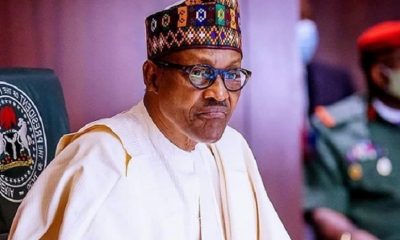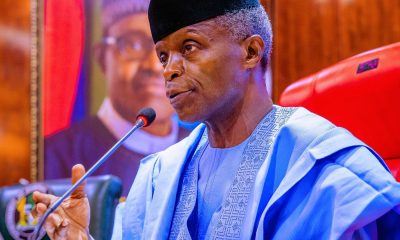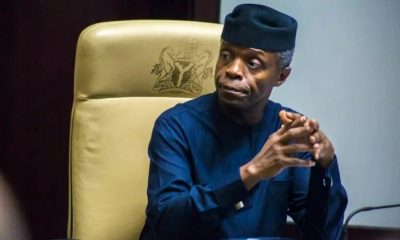General
Democracy Day Speech by Prof Yemi Osinbajo
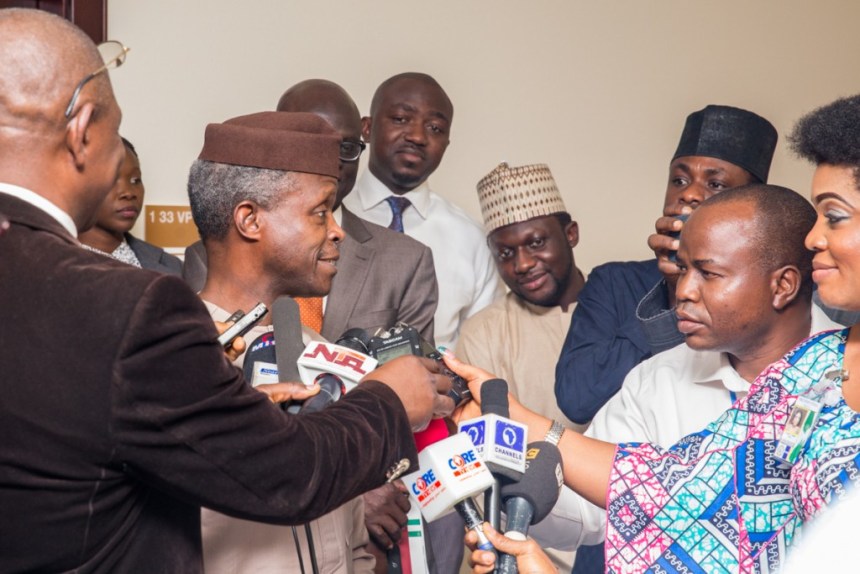
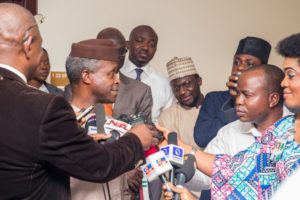
Dear Nigerians, I bring you good wishes from President Muhammadu Buhari, GCFR, who as we all know is away from the country on medical vacation.
Today marks the second anniversary of our assumption of office. We must thank the Almighty God not only for preserving our lives to celebrate this second anniversary, but for giving us hope, strength and confidence as we faced the challenges of the past two years.
Our administration outlined three specific areas for our immediate intervention on assumption of office: these were Security, Corruption and the Economy.
In the Northeast of our country, the terrorist group Boko Haram openly challenged the sovereignty and continued existence of the state, killing, maiming, and abducting, causing the displacement of the largest number of our citizens in recent history. Beyond the North East they extended their mindless killings, as far away as Abuja, Kano and Kaduna.
But with new leadership and renewed confidence our gallant military immediately began to put Boko Haram on the back foot. We have restored broken-down relations with our neighbours, Chad, Cameroon and Niger – allies without whom the war against terror would have been extremely difficult to win.
We have re-organized and equipped our Armed Forces, and inspired them to heroic feats; we have also revitalized the regional Multinational Joint Task Force, by providing the required funding and leadership.
The positive results are clear for all to see. In the last two years close to one million displaced persons have returned home. 106 of our daughters from Chibok have regained their freedom, after more than two years in captivity, in addition to the thousands of other captives who have since tasted freedom.
Schools, hospitals and businesses are springing back to life across the Northeast, especially in Borno State, the epicentre of the crisis. Farmers are returning to the farms from which they fled in the wake of Boko Haram. Finally, our people are getting a chance to begin the urgent task of rebuilding their lives.
Across the country, in the Niger Delta, and in parts of the North Central region, we are engaging with local communities, to understand their grievances, and to create solutions that respond to these grievances adequately and enduringly.
President Buhari’s New Vision for the Niger Delta is a comprehensive peace, security and development plan that will ensure that the people benefit fully from the wealth of the region, and we have seen to it that it is the product of deep and extensive consultations, and that it has now moved from idea to execution.
Included in that New Vision is the long-overdue environmental clean-up of the Niger Delta beginning with Ogoni-land, which we launched last year.
More recent threats to security such as the herdsmen clashes with farmers in many parts of the country sometimes leading to fatalities and loss of livelihoods and property have also preoccupied our security structures. We are working with State governments, and tasking our security agencies with designing effective strategies and interventions that will bring this menace to an end. We are determined to ensure that anyone who uses violence, or carries arms without legal authority is apprehended and sanctioned.
In the fight against corruption, we have focused on bringing persons accused of corruption to justice. We believe that the looting of public resources that took place in the past few years has to be accounted for. Funds appropriated to build roads, railway lines, and power plants, and to equip the military, that had been stolen or diverted into private pockets, must be retrieved and the culprits brought to justice.
Many have said that the process is slow, and that is true, corruption has fought back with tremendous resources and our system of administration of justice has been quite slow. But the good news for justice is that our law does not recognize a time bar for the prosecution of corruption and other crimes, and we will not relent in our efforts to apprehend and bring corruption suspects to justice.
We are also re-equipping our prosecution teams, and part of the expected judicial reforms is to dedicate some specific courts to the trial of corruption cases.
We are also institutionalizing safeguards and deterrents. We have expanded the coverage of the Treasury Single Account (TSA). We have introduced more efficient accounting and budgeting systems across the Federal Government. We have also launched an extremely successful Whistleblower Policy.
The Efficiency Unit of the Federal Ministry of Finance has succeeded in plugging leakages amounting to billions of naira, over the last two years. We have ended expensive and much-abused fertilizer and petrol subsidy regimes.
We have taken very seriously our promise to save and invest for the future, even against the backdrop of our revenue challenges, and we have in the last two years added US$500m to our Sovereign Wealth Fund and US$87m to the Excess Crude Account. This is the very opposite of the situation before now, when rising oil prices failed to translate to rising levels of savings and investment.
Admittedly, the economy has proven to be the biggest challenge of all. Let me first express just how concerned we have been, since this administration took office, about the impact of the economic difficulties on our citizens.
Through no fault of theirs, some companies shut down their operations, others downsized; people lost jobs, had to endure rising food prices. In some States civil servants worked months on end without the guarantee of a salary, even as rents and school fees and other expenses continued to show up like clockwork.
We have been extremely mindful of the many sacrifices that you have had to make over the last few years. And for this reason this administration’s work on the economic front has been targeted at a combination of short-term interventions to cushion the pain, as well as medium to long term efforts aimed at rebuilding an economy that is no longer helplessly dependent on the price of crude oil.
Those short-term interventions include putting together a series of bailout packages for our State Governments, to enable them bridge their salary shortfalls – an issue the President has consistently expressed his concerns about. We also began the hard work of laying out a framework for our Social Intervention Programme, the most ambitious in the history of the country.
One of the first tasks of the Cabinet and the Economic Management Team was to put together a Strategic Implementation Plan for the 2016 budget, targeting initiatives that would create speedy yet lasting impact on the lives of Nigerians.
Indeed, much of 2016 was spent clearing the mess we inherited and putting the building blocks together for the future of our dreams; laying a solid foundation for the kind of future that you deserve as citizens of Nigeria.
In his Budget Presentation Speech to the National Assembly last December, President Buhari outlined our Economic Agenda in detail, and assured that 2017 -would be the year in which you would begin to see tangible benefits of all the planning and preparation work. It is my pleasure to note that in the five months since he delivered that speech, we have seen tremendous progress, as promised.
Take the example of our Social Investment Programme, which kicked off at the end of 2016. Its Home Grown School Feeding component is now feeding more than 1 million primary school children across seven states and would be feeding three million by the end of the year. N-Power, another component has engaged 200,000 unemployed graduates – none of whom needed any ‘connections’ to be selected.
Beneficiaries are already telling the stories of how these initiatives have given them a fresh start in their lives.
Micro credit to a million artisans, traders and market men and women has begun. While conditional cash transfers to eventually reach a million of the poorest and most vulnerable households has also begun.
Road and power projects are ongoing in every part of the country. In rail, we are making progress with our plans to attract hundreds of millions of dollars in investment to upgrade the existing 3,500km narrow-gauge network. We have also in 2017 flagged-off construction work on the Lagos-Ibadan leg of our standard-gauge network, and are close to completing the first phase of Abuja’s Mass Transit Rail System.
In that Budget speech in December, the President announced the take-off of the Presidential Fertilizer Initiative. Today, five months on, that Initiative – the product of an unprecedented bilateral cooperation with the Government of Morocco – has resulted in the revitalisation of 11 blending plants across the country, the creation of 50,000 direct and indirect jobs so far, and in the production of 300,000 metric tonnes of NPK fertilizer, which is being sold to farmers at prices significantly lower than what they paid last year. By the end of 2017, that Fertilizer Initiative would have led to foreign exchange savings of US$200 million; and subsidy savings of 60 billion naira.
The Initiative is building on the solid gains of the Anchor Borrowers Programme, launched in 2015 to support our rice and wheat farmers, as part of our move towards guaranteeing food security for Nigeria.
All of this is evidence that we are taking very seriously our ambition of agricultural self-sufficiency. I am delighted to note that since 2015 our imports of rice have dropped by 90 percent, while domestic production has almost tripled. Our goal is to produce enough rice to meet local demand by 2019.
In April, the President launched our Economic Recovery and Growth Plan which built on the foundations laid by the Strategic implementation Plan of 2016. The plan has set forth a clear vision for the economic development of Nigeria. I will come back to this point presently.
Another highlight of the President’s Budget Speech was our work around the Ease of Doing Business reforms. As promised we have since followed up with implementation and execution. I am pleased to note that we are now seeing verifiable progress across several areas, ranging from new Visa on Arrival scheme, to reforms at our ports and regulatory agencies.
The President also promised that 2017 would see the rollout of Executive Orders to facilitate government approvals, support procurement of locally made goods, and improve fiscal responsibility. We have kept that promise. This month we issued three Executive Orders to make it easier for citizens to get the permits and licenses they require for their businesses, to mandate Government agencies to spend more of their budgets on locally produced goods, and to promote budget transparency and efficiency. The overarching idea is to make Government Agencies and Government budgets work more efficiently for the people.
The impact of our Ease of Doing Business work is gradually being felt by businesses small and large; its successful take-off has allowed us to follow up with the MSME Clinics – our Small Business support programme, which has taken us so far to Aba, Sokoto, Jos, Katsina, and we expect to be in all other states in due course.
Let me note, at this point, that several of our Initiatives are targeted at our young people, who make up most of our population. From N-Power, to the Technology Hubs being developed nationwide, to innovation competitions such as the Aso Villa Demo Day, and our various MSME support schemes, we will do everything to nurture the immense innovative and entrepreneurial potential of our young people. We are a nation of young people, and we will ensure that our policies and programmes reflect this.
One of the highlights of our Power Sector Recovery Programme, which we launched in March, is a N701 billion Naira Payment Assurance Scheme that will resolve the financing bottlenecks that have until now constrained the operations of our gas suppliers and generation companies. Let me assure that you will soon begin to see the positive impact of these steps.
Our Solid Minerals Development Fund has also now taken off, in line with our commitment to developing the sector. Because of our unerring focus on Solid Minerals development over the last two years, the sector has, alongside Agriculture, seen impressive levels of growth – in spite of the recession.
On the whole, just as the President promised in the Budget Speech, these early months of 2017 have seen the flowering of the early fruit of all the hard work of our first eighteen months.
We opened the year with an overwhelmingly successful Eurobond Offer – evidence of continuing investor interest in Nigeria. We have also launched the Economic Recovery and Growth Plan (ERGP) 2017-2020, to build on the gains of last year’s Strategic Implementation Plan. And the implementation of our 2017 Budget, which will soon be signed into law, will bring added impetus to our ongoing economic recovery. In the 2016 Budget we spent 1.2 trillion Naira on infrastructure projects, another milestone in the history of this country. Our 2017 Budget will double that investment.
That budget also provides for substantial investment to implement the rollout of Industrial Parks and Special Economic Zones (SEZs), as well as our Social Housing Programme. The Industrial Parks and Economic Zones will fulfill our ambition of making Nigeria a manufacturing hub, while the Family Home Fund of our Social Housing Programme will provide inexpensive mortgages for low-income individuals and families across the country.
These plans offer yet more evidence that we are ramping up the pace of work; the work of fulfilling all that we promised. In the next two years we will build on the successes of the last two. We have demonstrated a willingness to learn from our mistakes and to improve on our successes.
The critical points that we must address fully in the next two years are: Agriculture and food security, Energy, (power and Petroleum,) Industrialization and Transport infrastructure. Every step of the way we will be working with the private sector, giving them the necessary incentives and creating an environment to invest and do business.
Our vision is for a country that grows what it eats and produces what it consumes. It is for a country that no longer has to import petroleum products, and develops a lucrative petrochemical industry. Very importantly it is for a country whose fortunes are no longer tied to the price of a barrel of crude, but instead to the boundless talent and energy of its people, young and old, male and female as they invest in diverse areas of the economy.
And that vision is also for a country where the wealth of the many will no longer be stolen by or reserved for a few; and where the impunity of corruption – whether in the public or private sectors – will no longer be standard operating practice; a land rid of bandits and terrorists.
As citizens you all deserve a country that works, not merely for the rich or connected, but for everyone. And our promise to you is that we will, with your support and cooperation, take every step needed to create that country of our dreams.
We also know that this journey will of necessity take time. But we will not succumb to the temptation to take short-cuts that ultimately complicate the journey. We did not find ourselves in crises overnight, and we simply do not expect overnight solutions to our challenges.
The most important thing is that we are on the right path, and we will not deviate from it, even in the face of strong temptation to choose temporary gain over long-term benefit. As the President has summed it up: “The old Nigeria is slowly but surely disappearing, and a new era is rising.”
And so we commemorate this second anniversary of our administration with confidence and optimism. I firmly believe that we have put the most difficult phase behind us; and we are witnesses to the ever-increasing intensity of the light at the end of the tunnel.
We ask for your continued cooperation and support, to enable us realise all our best intentions and ambitions for Nigeria. On our part, we will continue to carry you along on this journey, speak to you, explain the challenges, and share our vision.
And while we all daily pre-occupy ourselves with pursuing the Nigerian Dream – which is the desire to better our lives and circumstances vigorously and honestly – it is inevitable that grievances and frustrations will arise from time to time.
This is normal. What is not normal, or acceptable, is employing these frustrations as justification for indulging in discrimination or hate speech or hateful conduct of any kind, or for seeking to undermine by violent or other illegal means the very existence of the sovereign entity that has brought us all together as brothers and sisters and citizens.
Nigeria belongs to all of us. No one person or group of persons is more important or more entitled than the other in this space that we all call home. And we have a responsibility to live in peace and harmony with one another, to seek peaceful and constitutional means of expressing our wishes and desires, and to resist all who might seek to sow confusion and hatred for their own selfish interests.
Before I end this speech, let me ask for your continued prayers for the restoration to full health and strength and the safe return of our President.
I congratulate all of you on today’s commemoration of this important day in the democratic calendar our country. Nigeria is on a journey of greatness, and together we shall arrive at the destination of our dreams.
May God bless you all, and bless the Federal Republic of Nigeria.
General
Nigeria Signs Defence Joint Venture with Terra Industries

By Adedapo Adesanya
Nigeria has signed a joint venture with defence technology company, Terra Industries Limited, as part of efforts to boost the country’s defence industrial capacity and advance indigenous high-technology development.
The Defence Industries Corporation of Nigeria (DICON) and Terra signed a Memorandum of Understanding (MoU) for the establishment of the Joint Venture Company (JVC), both parties announced on Monday.
The partnership provides a robust framework for the local production, assembly, research and development (R&D), and training in high-technology systems, including drones, cybersecurity solutions, robotics, and other ancillary software and hardware platforms.
The MoU, executed pursuant to the DICON Act 2023, underscores DICON’s statutory mandate to collaborate with indigenous and foreign defence-related industries through Public-Private Partnerships. Under the agreement, the Joint Venture Company will operate as a subsidiary of DICON, jointly promoted and owned by DICON and Terra Industries, and duly incorporated in Nigeria.
This marks the latest move by Terra, which recently became a $100 million company, following recent raises from investors including Flutterwave CEO, Mr Gbenga Agboola, American actor Jared Leto as well as 8VC founded by the co-founder of Palantir Technologies Inc., Mr Joe Lonsdale. Other investors included Valor Equity Partners, Lux Capital, SV Angel, Leblon Capital GmbH, Silent Ventures LLC, Nova Global.
Terrahaptix, founded by Mr Nathan Nwachukwu and Mr Maxwell Maduka, are using the new funding to expand Terra’s manufacturing capacity as it expands into cross-border security and counter-terrorism.
The latest agreement with DICON is designed to establish advanced production and assembly lines for high-tech equipment within Nigeria, while promoting meaningful technology transfer, skills development, and specialised training for Nigerian personnel.
It also aims to strengthen local sourcing of raw materials, reduce dependence on imports, and enhance domestic industrial capacity and strategic autonomy. Additionally, the partnership will support the supply of security equipment to the wider Nigerian security agencies, other security agencies, positioning Nigeria as a competitive player in the global defence manufacturing sector.
Under the agreement, Terra Industries will provide technical expertise, professional services, and training, and will attract both local and foreign investment to strengthen the defence industrial ecosystem.
The company will also facilitate the procurement of production equipment, coordinate local and international training programmes, and provide access to manufacturing know-how, tooling, spare parts, and established defence sector supply chains.
Speaking on this, Mr Nathaniel Nwachukwu, CEO of Terra Industries, noted that the partnership “Demonstrates confidence in indigenous Nigerian engineering capability and creates a platform for sustainable defence technology development, innovation, and export competitiveness.”
On his part, Major General BI Alaya, the Director General of DICON, described the agreement as “A transformational step toward strengthening Nigeria’s defence manufacturing base, reducing import dependence, and positioning Nigeria as a regional hub for advanced innovation.”
The need for security has risen in recent years, as groups such as Islamic State and al-Qaeda are gaining ground in Africa, converging along a swathe of territory that stretches from Mali to Nigeria.
General
Deep Blue Project: Mobereola Seeks Air Force Support

By Adedapo Adesanya
The Director General of the Nigerian Maritime Administration and Safety Agency (NIMASA), Mr Dayo Mobereola, is seeking enhanced cooperation between the agency and the Nigerian Air Force (NAF) with the aim of strengthening tactical air support within the Deep Blue project.
During a courtesy visit last week, Mr Mobereola told the Chief of Air Staff, Air Marshall S. K. Aneke at the NAF Headquarters in Abuja, that the Air Force was a strategic partner in enhancing maritime security in Nigeria and sustaining the momentum of the Deep Blue Project’s success.
According to the DG, “We are here to seek the Air Force’s support, given the importance of tactical air surveillance to the Deep Blue Project. Nigeria is the only African country with a record of zero piracy within the last 4 years. The Deep Blue Project platforms have been used to achieve zero piracy and sea robberies in the Gulf of Guinea, and we need your collaboration to sustain this momentum”.
He further emphasised that international trade depends on security, which is why vessels prefer to go to or transit through countries where they are secured. “With the traffic we have now, we need to show more security might through collaboration to strengthen our trade viability because of the risks attached to our route. We need these collaborations to sustain what we have achieved so far with the Deep Blue Project”.
The NIMASA DG expressed hope that the collaboration with the Nigeria Air Force will reduce response time.
On his part, the Chief of Air Staff, Air Marshall S.K. Aneke, noted that the Air Force desires to be “a very supportive and collaborative partner with NIMASA and is ready to match the Agency step by step and side by side to achieve the desired results.”
He noted that “collaboration between NIMASA and the Nigerian Air Force under the Deep Blue Project can be strengthened through a joint strategic framework, integrated command structures, and a standing steering committee to ensure shared objectives and accountability.
“Establishing a joint maritime domain awareness fusion cell will enable real-time intelligence sharing, synchronised surveillance, and faster response to maritime threats and ensure sustained operational effectiveness across Nigeria’s territorial waters and exclusive economic zone,” he said, according to a statement.
The Air Force Chief added that the Air Force can also support NIMASA outside the Deep Blue Project operations by providing its own ISR platforms, tactical air support, and rapid airborne deployment for interdictions and search and rescue missions.
While thanking the NIMASA DG for the basic trainings the Agency has provided the aircraft pilots under the Deep Blue Project, Air Marshall Aneke also highlighted areas of operational challenges needing NIMASA’s attention to include bridging the communication gap between NAF operators and NIMASA, higher level and in-depth maintenance trainings, readily available fueling of aircrafts to avoid delays on missions, and provision of flying kits among others.
He therefore pledged the Air Force’s collaboration and assured that the request by NIMASA has been noted and that things will begin to move at thrice its speed going forward.
General
Nigeria’s Democracy Suffocating Under Tinubu—Atiku

By Modupe Gbadeyanka
Former Vice President, Mr Atiku Abubakar, has lambasted the administration of President Bola Tinubu for the turnout at the FCT Area Council elections held last Saturday.
In a statement signed by his Media Office, the Adamawa-born politician claimed that the health of Nigeria’s democracy under the current administration was under threat.
According to him, “When citizens lose faith that their votes matter, democracy begins to die. What we are witnessing is not mere voter apathy. It is a direct consequence of an administration that governs with a chokehold on pluralism. Democracy in Nigeria is being suffocated slowly, steadily, and dangerously.”
He warned that the steady erosion of participatory governance, if left unchecked, could inflict irreversible damage on the democratic fabric painstakingly built over decades.
“A democracy without vibrant opposition, without free political competition, and without public confidence is democracy in name only. If this chokehold is not released, history will record this era as the period when our hard-won freedoms were traded for fear and conformity,” he stressed.
Mr Atiku said the turnout for the poll was below 20 per cent, with the Abuja Municipal Area Council (AMAC) recording 7.8 per cent.
He noted that such civic participation in the nation’s capital, the symbolic heartbeat of the federation, is not accidental, as it is the predictable outcome of a political environment poisoned by intolerance, intimidation, and the systematic weakening of opposition voices.
The presidential candidate of the People’s Democratic Party (PDP) in the 2023 general elections stated that the ruling All Progressives Congress (APC) under Mr Tinubu has pursued a deliberate policy of shrinking democratic space, harassing dissenters, coercing defectors, and fostering a climate where alternative political viewpoints are treated as threats rather than contributions to national development.
He called on opposition parties and democratic forces across the country to urgently close ranks and forge a united front, declaring, “This is no longer about party lines; it is about preserving the Republic. The time to stand together to rescue and rebuild Nigeria is now.”
-

 Feature/OPED6 years ago
Feature/OPED6 years agoDavos was Different this year
-
Travel/Tourism10 years ago
Lagos Seals Western Lodge Hotel In Ikorodu
-

 Showbiz3 years ago
Showbiz3 years agoEstranged Lover Releases Videos of Empress Njamah Bathing
-

 Banking8 years ago
Banking8 years agoSort Codes of GTBank Branches in Nigeria
-

 Economy3 years ago
Economy3 years agoSubsidy Removal: CNG at N130 Per Litre Cheaper Than Petrol—IPMAN
-

 Banking3 years ago
Banking3 years agoSort Codes of UBA Branches in Nigeria
-

 Banking3 years ago
Banking3 years agoFirst Bank Announces Planned Downtime
-

 Sports3 years ago
Sports3 years agoHighest Paid Nigerian Footballer – How Much Do Nigerian Footballers Earn


